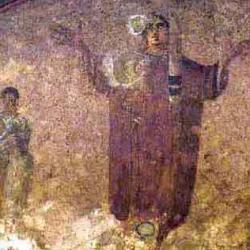Trace the development of the Hebrew massa’ (“burden”) through the Bible.
In Torah, it refers to the physical labor of the Levites, carrying the furniture of the tabernacle and especially the ark.
In Chronicles, it refers to the Levitical “burden” of singing (1 Chronicles 15:22, 27). They no longer carry the sanctuary from place to place, but they still lift Yahweh up on the shoulders of their praise. Song is analogous to bearing the Lord and His house, the Lord who is enthroned in the praises of Israel.
In the prophets, massa’ is an “oracle,” the prophet’s burden of prophecy (e.g., Isaiah 13:1).
Can we press the analogies? Let’s try.
If massa’ retains its Torah meaning when the prophets use it, then the prophet is like a Levite holding up the Lord’s throne. He is an agent of the High King of Israel not only to deliver the king’s message but to bear the king’s presence. This fits neatly with 2 Kings, which treats Elisha as a bearer of divine presence (a woman even sets up an upper room that contains a menorah, a table, and a bed – a personal holy place).
If massa’ retains its musical meaning when the prophets use it, then perhaps the prophet’s burdens are sung. This would be consistent with the Chronicler’s portrait of Levitical song as itself a form of prophesying (1 Chronicles 25:1). Levites prophecy in song; prophets sing musical massa’.
And we, when we sing, are lifting up the Lord in our praises and prophesying.












